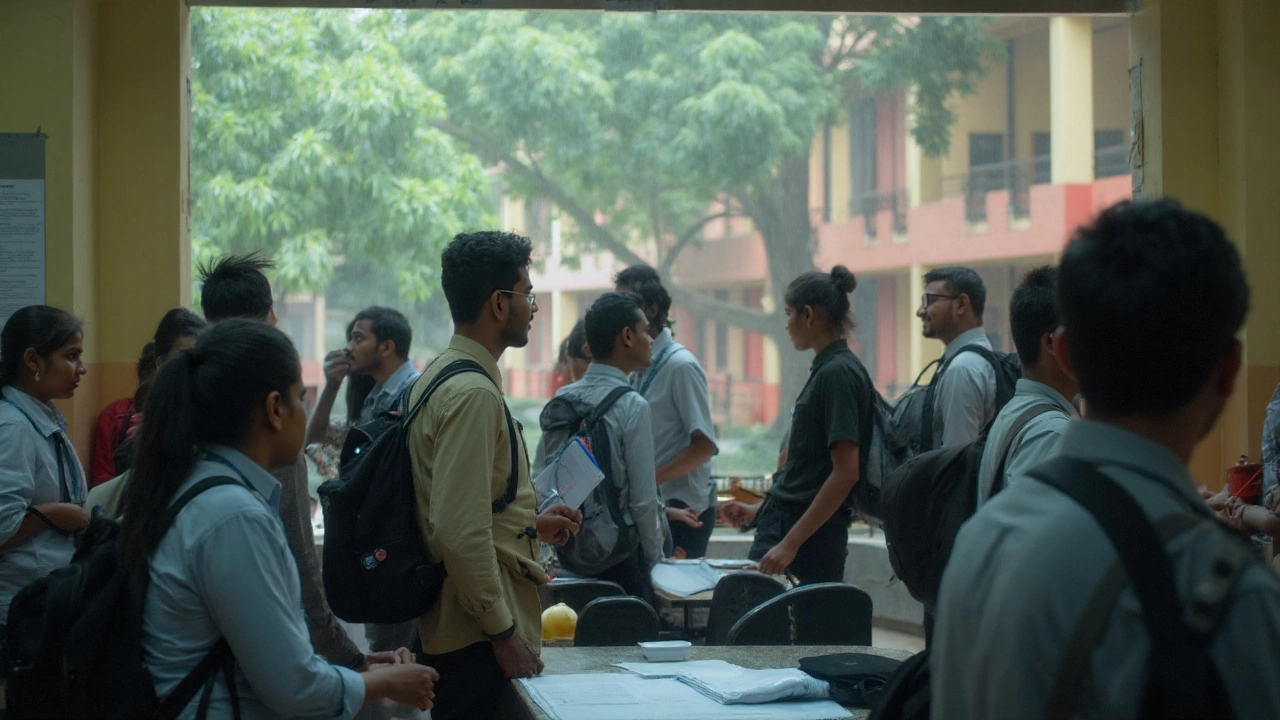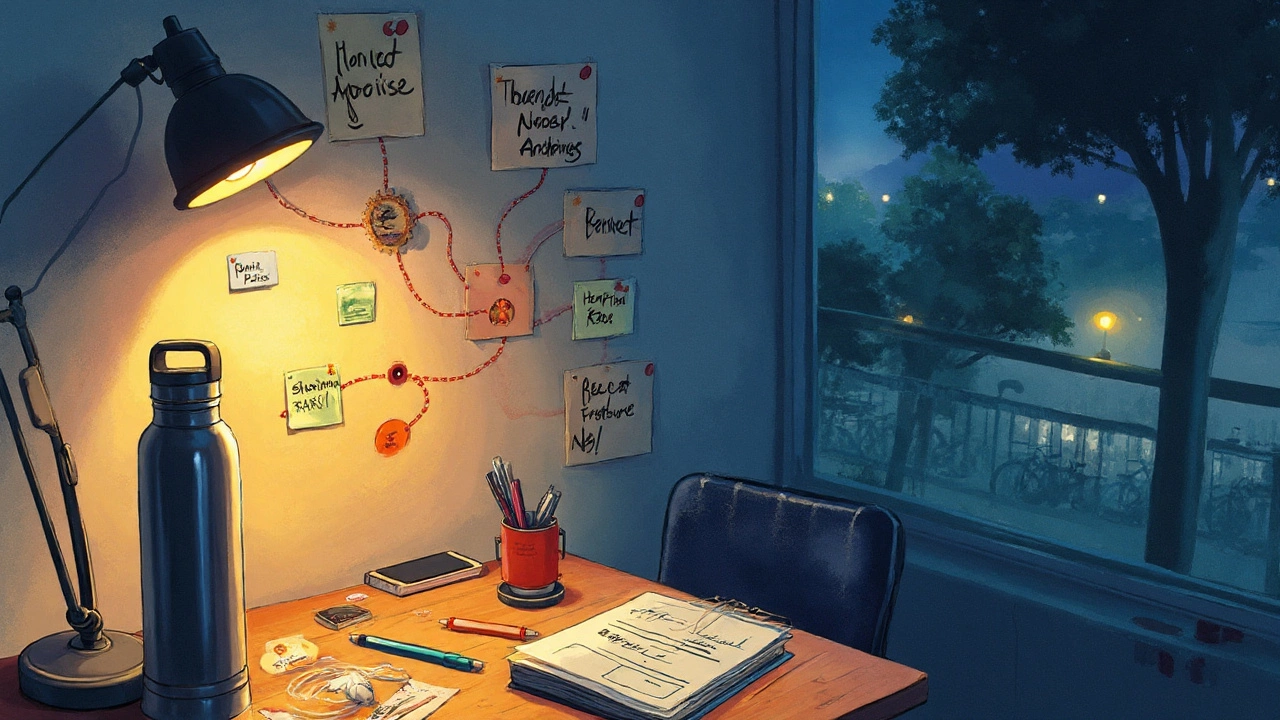
You clicked because you want a straight answer: which IIT subject is best? Here’s the honest version. There isn’t one single winner for everyone. There’s the best fit for you. What I can give you is a clear, no-hype way to decide-grounded in 2023-24 IIT placement trends, how the work actually feels, and the kind of future each branch sets up. I mentor JEE students from Melbourne on weekends, and the kids who do well long-term aren’t chasing this year’s salary spike; they pick a path they can stick with through hard semesters and changing markets.
- TL;DR: If you love coding and math, CSE/MnC/AI-DS are the safest bets for breadth of roles and pay; if you enjoy hardware/systems, ECE/EE give both core and software options; for building real-world stuff, Mech/Civil/Chem are meaningful and stable, just less hyped.
- Branch vs college: at very top IITs, the campus network and depth matter; otherwise, the branch often matters more for your first job. Use the 70-20-10 rule: 70% fit, 20% markets, 10% hype.
- Switching after first year is possible but rare and cutoff-driven; don’t bank on it.
- 2023-24 placements: CSE/MnC/AI median offers at top IITs are often in the 25-35 LPA band; EE/ECE follow; core branches are lower but offer PSU/research/industry roles that age well.
- If you can’t get your dream branch, use minors, projects, and internships to pivot. Recruiters care about proof of skill, not just the branch code on your ID.
How to choose your IIT subject: criteria, rules, and useful myths to break
Your real jobs-to-be-done after clicking this were simple: pick a branch with eyes open, map it to actual careers, avoid a regret loop, and build a shortlist you can use in JoSAA. Here’s the playbook I share with my students.
- 1) Fit-first, not FOMO: What will you happily do for 15 focused hours a week? If it’s coding, algorithms, and building apps, you’ll thrive in CSE/MnC/AI-DS. If it’s circuits, signals, hardware, and embedded, ECE/EE. If it’s machines, manufacturing, and design, Mech. If it’s bridges, soil, and cities, Civil. Chemistry labs and processes? Chem. This single check beats most prediction charts.
- 2) The 70-20-10 Rule: Weigh 70% on fit, 20% on current market, 10% on hype. Markets swing. Hype dies. Skill compounding stays.
- 3) Branch vs college trade-off: If you’re choosing between a top 5-7 IIT in a non-dream branch vs a new IIT in your dream branch, think about your first 5 years. Your first job depends more on your skill and projects than the logo, unless you’re comparing truly elite campuses. Rough rule: pick dream branch at good campus over random branch at a newer one; pick elite campus when the difference is only one notch in interest.
- 4) Exit options: Software is the widest door-CSE, ECE, EE, MnC, AI-DS all feed into it. Core roles (Mech/Civil/Chem/Met/EP/Aero/Bio) are narrower but meaningful and can lead to PSU roles, research, and deep-specialist industry tracks.
- 5) Future-proofing score: Look for versatility. CSE/MnC/AI-DS/ECE/EE have high career mobility; Mech/Civil/Chem/Met need deeper domain buildup but are hard to replace and vital for infrastructure, energy, and manufacturing.
- 6) Branch change reality check: It happens, but cutoffs are brutal. Only a small slice move into CSE in top IITs. Plan as if you will not switch.
- 7) Workstyle matters: Love quiet solo problem-solving? CSE/MnC/AI-DS fit. Like lab time and hands-on builds? Mech/Chem/Met/Civil. Enjoy theory + systems? ECE/EE/EP. You’re picking four years of weekdays, not just a job title.
Quick sanity tests:
- Signal test: Do you find yourself coding for fun or taking apart gadgets? That signal beats every “hot list.”
- Frustration test: Which pain can you tolerate-debugging all night, a noisy lab, or a finicky lathe? You will hit hard days. Pick your pain.
- Course catalog test: Read the 1st-2nd year core courses of your shortlists on the IIT site. If most classes excite you, you’re close.
Branch vs college heuristic you can apply in 60 seconds:
- If you can get CSE/MnC/AI-DS/ECE at IIT Bombay/Delhi/Madras/Kanpur/Kharagpur/Roorkee/Guwahati, the campus depth and network are hard to beat.
- If the choice is CSE at a new IIT vs a branch you dislike at an old IIT, take the branch you like. You’re the one attending the classes.
- If the choice is ECE/EE at a top IIT vs CSE at a new IIT and you enjoy both, the top IIT often wins due to flexibility and peer quality.
Data anchors to keep you steady (2023-24):
- Placement reports across top IITs show median pay bands highest for CSE/MnC/AI-DS, followed by ECE/EE; core branches vary more by campus and year. Check reports from IIT Bombay, IIT Delhi, IIT Madras, and your target campus.
- NIRF 2024 rankings and department profiles show research strength; stronger departments often mean better labs, projects, and recruiters.
- PSU/GATE routes still favor core branches; GATE 2024 data shows steady intake for core-heavy areas. If a PSU job is your dream, plan for GATE early.
One more myth to bin: “AI killed everything else.” It didn’t. AI raised the bar for computing-heavy branches and increased the software pull for ECE/EE. But real-world infrastructure, energy, manufacturing, and materials are still must-haves. Markets rebalance. Skills compound.

Branch-by-branch: outcomes, best for/not for, and the trade-offs that matter
Here’s the practical view of the most common IIT subjects. I’ll stick to how the work feels, the roles grads get, and who thrives. Salary numbers vary by campus and cycle; focus on patterns and mobility.
| Branch | Work vibe | Career mobility | Median band (top IITs) | Switch to software? |
|---|---|---|---|---|
| CSE | Algorithms, systems, code | Very high | Often 25-35 LPA | Yes (native) |
| MnC | Math-heavy CS + finance options | Very high | Often 22-32 LPA | Yes |
| AI/DS | ML, data pipelines, stats | High | Often 20-30 LPA | Yes |
| ECE | Signals, VLSI, comms | High | Often 18-28 LPA | Yes (with projects) |
| EE | Power, control, systems | High | Often 18-28 LPA | Yes (with projects) |
| Mech | Design, manufacturing, thermo | Medium | Often 12-20 LPA | Possible (needs proof) |
| Civil | Structures, geotech, transport | Medium | Often 10-18 LPA | Possible (harder) |
| Chem | Processes, plants, materials | Medium | Often 12-20 LPA | Possible (data + coding) |
| Met/Materials | Metals, polymers, semiconductors | Medium | Often 10-18 LPA | Possible (niche) |
| Engg Physics | Deep math/physics, devices | Medium-High | Varies widely | Yes (quant, ML, devices) |
| Aerospace | Fluids, structures, controls | Medium | Varies, niche | Possible (controls/ML) |
| Biotech/Bioeng | Bio + chem + computation | Medium | Varies | Possible (bioinformatics) |
Computer Science (CSE)
- You’ll do: Algorithms, OS, networks, DBs, systems design. Lots of coding and theory.
- Outcomes: Software engineering, systems, product, research roles. Strong internship pipeline. 2023-24 median offers at top IITs often in the 25-35 LPA band; new IITs lower.
- Best for: People who enjoy coding, problem-solving, reading docs, and building things weekly.
- Not for: If you dislike long debugging sessions or abstract thinking.
Mathematics & Computing (MnC)
- You’ll do: Real analysis, linear algebra, probability, algorithms, some finance.
- Outcomes: Software, quant, data science. Often overlaps with CSE placements; finance opens up for the math-heavy profile.
- Best for: People who love math with code. Enjoy proofs and probability.
- Not for: If pure math drains you.
Artificial Intelligence / Data Science (AI-DS)
- You’ll do: ML, stats, data engineering, optimization.
- Outcomes: Data engineering, applied ML, analytics; some software roles. Great when the program is housed in a strong CS/ECE department.
- Best for: People excited by models and data pipelines, not just “AI buzz.”
- Not for: If you want to avoid coding or heavy math.
Electronics & Communication (ECE)
- You’ll do: Signals, VLSI, communications, embedded systems.
- Outcomes: Chip design, embedded, comms, and also software with the right projects. Big upside with the semiconductor push in India.
- Best for: Folks who enjoy both mathy theory and real hardware.
- Not for: If labs and circuits frustrate you.
Electrical Engineering (EE)
- You’ll do: Power systems, control, machines, signals.
- Outcomes: Power/energy, control systems, EVs, grid tech; software possible via systems/ML projects. PSU path via GATE is clear.
- Best for: Systems thinkers who like math + hardware.
- Not for: If you want only app/web dev with no hardware/math.
Mechanical Engineering (Mech)
- You’ll do: Design, manufacturing, thermal, CAD/CAE.
- Outcomes: Manufacturing, design, automotive, energy; strong path to PSU/GATE, robotics/mechatronics with the right projects.
- Best for: People who like building physical systems and design.
- Not for: If you expect the same software salary curve without coding proof.
Civil Engineering
- You’ll do: Structures, geotech, water, transport.
- Outcomes: Infrastructure firms, consulting, government, PSUs. Meaningful work; salaries vary by region and role.
- Best for: City/building/infra nerds who like field + design mix.
- Not for: If you want pure desk-work and zero site time.
Chemical Engineering
- You’ll do: Thermo, mass transfer, reactor design, process control.
- Outcomes: Energy, FMCG, pharma, process consulting; strong path with GATE/MS.
- Best for: Lab/process lovers who enjoy systems thinking.
- Not for: If chemistry bores you or you avoid labs.
Metallurgical/Materials Engineering
- You’ll do: Metals, ceramics, polymers, characterization.
- Outcomes: Steel, manufacturing, semiconductors, batteries; research routes are strong.
- Best for: Materials geeks, especially if you like microscopy and devices.
- Not for: If you want wide generalist roles immediately.
Engineering Physics
- You’ll do: EM, quantum, devices, advanced math.
- Outcomes: Research, semiconductors, optics, quant/ML for the math-strong; variance is high but upside exists.
- Best for: Theory lovers with patience for hard problems.
- Not for: If you dislike abstract math.
Aerospace Engineering
- You’ll do: Aero/space structures, fluids, controls, propulsion.
- Outcomes: Aerospace firms, R&D, defense; roles are niche but rewarding. Many grads pivot to systems/controls/software.
- Best for: Space and flight enthusiasts who accept a narrower market.
- Not for: If you need a wide placement net without extra effort.
Biotech/Biological Engineering
- You’ll do: Bio systems, bioprocess, computation for biology.
- Outcomes: Pharma, bioinformatics, research; value grows with higher studies.
- Best for: Strong bio interest with comfort in chem/math.
- Not for: If you dislike wet labs.
Best-for vs Not-for quick cheat sheet
- If you want the widest job market: CSE, MnC, AI-DS, ECE, EE.
- If you want PSU/stable government track: EE, Mech, Civil, Chem (via GATE).
- If you want research/PhD abroad: EP, Materials, ECE/EE, and strong research projects in any branch.
- If you want hardware + software flexibility: ECE, EE.
- If you want to build physical products: Mech, Materials, Aero, Civil.
Pro tips recruiters actually notice:
- Projects beat branch codes. A solid GitHub or a real prototype matters more than your course list.
- Interns who ship things get return offers. Optimize for teams that let you build.
- For core roles, hands-on lab/club experience (SAE, robotics, satellite, formula student) is gold.

Your plan: scenarios, FAQs, and next steps you can act on this week
This is the section you screenshot during JoSAA. Use it to make choices fast and avoid second-guessing.
Decision tree (short version):
- Do you enjoy writing code for hours? If yes → CSE or MnC; if math-first → MnC; if AI pulls you → AI-DS at a strong CS/ECE dept. If no → go to 2.
- Do you like circuits/systems/hardware? If yes → ECE or EE. If no → go to 3.
- Do you want to build physical things? If yes → Mech or Civil. If you like processes/chemistry → Chem. If physics theory/devices excite you → EP/Materials. If space lures you and you accept niche roles → Aero. If bio → Biotech.
- Still torn? Pick the branch with courses you’d take even if there were no placements next year.
Common scenarios
- AIR ~2,000-5,000: You may see CSE/MnC/AI-DS at new IITs and ECE/EE at old IITs. If both interest you, ECE/EE at an old IIT can be a great balance-strong peers, good software crossover, and solid core labs.
- AIR ~5,000-10,000: Think ECE/EE/Mech at established IITs, or CSE at new IITs/IIITs. If you live and breathe code, a strong IIIT with CSE can beat an IIT in a branch you dislike.
- AIR ~10,000-15,000: Core branches at older IITs or CSE at newer ones. If you want software, take any branch but start coding from semester 1-clubs, contests, projects.
- Dreaming of PSU: EE/Mech/Civil/Chem with a GATE plan from year 2. Mock tests early. Summer internships in relevant plants/projects.
- Research/PhD abroad: Join a prof’s lab early. Publish or present. Build a strong SOP with genuine research stories.
Branch vs college-two quick rules:
- If your interest gap is large, pick branch. If your interest gap is small, pick the stronger campus.
- Think first job and first 5 years. After that, your portfolio and network matter more than your branch.
Checklist for your shortlist (do this in one evening):
- Pick 3 branches you’d enjoy without placements. Yes, be that honest.
- Open department pages for those branches at your target IITs. Skim core courses and labs.
- Scan the latest placement report for those departments on the IIT site. Note median bands and top roles (don’t obsess over the max).
- Message two seniors/alums per branch. Ask: “What surprised you in this branch?”, “What would you change?”
- Write your order across 20-30 choices for JoSAA. Sleep on it. Adjust once.
Credible sources to trust (no links, just names to search):
- IIT Bombay/Delhi/Madras placement reports 2023-24
- NIRF India Rankings 2024
- JoSAA Business Rules 2024
- GATE 2024 Organizing Institute reports
- AICTE dashboards for program intake and approvals
Mini-FAQ
- Which branch pays the most right now? Across top IITs, CSE and MnC often lead, with AI-DS close, then ECE/EE. Numbers shift by campus and cycle; look at medians, not headline max.
- Is AI/DS better than CSE? Different. CSE gives broad foundations and wider role coverage. AI-DS is focused; it’s great in a strong department. If unsure, CSE is safer; you can specialize later.
- ECE vs EE? ECE leans towards signals/VLSI/comms and has strong software crossover; EE leans power/control/systems with PSU routes. Both are flexible. Pick based on which core courses excite you more.
- Old IIT Mech vs new IIT CSE? If you love coding and will put in work, CSE at a newer IIT or IIIT can be better for software careers. If you want core/PSU/design and the older IIT is strong, Mech there can be great.
- Dual degree worth it? Only if you want research depth or the specific department. Five years is long; don’t lock in just to chase a stipend.
- Can I switch to CSE later? Possible but rare. Treat it as bonus, not plan A. If you want software, start coding no matter your branch.
Pitfalls to avoid
- Picking a branch because of one friend’s package. One data point is just a story.
- Ignoring course content. If you hate the syllabus, four years will feel like forty.
- Assuming “IIT tag = any job.” You still need projects, internships, and proof of skill.
What if things go sideways?
- You don’t like your branch: Earn high grades in shared courses, apply for a branch change if realistic, otherwise stack a minor and projects in your target area.
- Placements dip your year: Double down on internships and off-campus applications. Open-source and competitions help you stand out.
- Grades slip: Fix the process-weekly study blocks, past paper practice, group study. One strong semester can reset your trajectory.
Next steps this week
- Make a 3-column shortlist: Love, Like, No. Put branches in, not colleges yet.
- For each Love branch, pick 4-5 IITs you’d actually attend. Check their course plans and labs.
- Skim the department-wise placement report for each. Write down median bands and top role types.
- Talk to two seniors per branch. Ask about workload, labs, and internship culture.
- Draft your JoSAA list in strict order of preference. Sleep on it. Share with one mentor for feedback. Finalize.
Last word, from someone who’s watched many cohorts: the best IIT subject is the one you’ll grind at when nobody is watching. Markets will swing. Your curiosity and consistency won’t. Pick the branch that makes you want to leave your phone in another room and build something for three hours straight. That feeling is your compass-and it rarely points you wrong.
